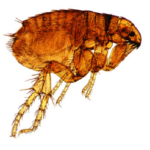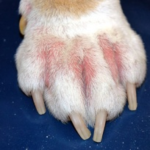Why is my dog so Itchy?
Itchy skin caused by allergies is one of the most common reasons for dogs to visit the vet! Allergies are very common, and very frustrating.
Yeah he itches, isn’t that normal?
Sure! A little itching can be absolutely normal. However, if your dog itches so much he injures himself, itches constantly, keeps you and himself up at night, or has a strong response to you touching neck/back and/or chest, the itch probably isn’t normal! In many cases, itchy skin is a result of allergies.
Causes of Allergies:
Fleas
Flea bite dermatitis can quickly get out of hand. Fleas alone are enough to make a dog itch. A dog with flea allergy dermatitis will quickly get inflamed, angry skin. In addition, a dog with either a seasonal or food allergy can have the itch exacerbated by concurrent fleas! This is the simplest allergy to rule out. Even if your dog does not have an active flea problem, routine flea prevention should be used to prevent the pet from being infested with fleas.
Food Allergies
A food allergy is usually a result of an allergic reaction to the protein source. Usually this is beef or chicken. Most dogs will manifest a food allergy with repetitive ear infections, itchy skin, and repetitive skin infections. Food allergies can be extremely difficult to diagnose, as the only way of definitively diagnosing a food allergy is with a strict diet trial. A diet trial is executed by strictly limiting a dog to either a novel protein source (such as Kangaroo, bison, rabbit, etc.) or to a hydrolyzed diet. Beware! Many over the counter diets are not truly limited ingredient, and contain small amounts of other proteins such as chicken meal. The most reliable diets are prescription diets. A hydrolyzed diet can only be obtained with a prescription. The proteins in these diets are broken down so small that the body can use them for energy, without the protein eliciting an immune response. One challenge of a diet trial is to prevent dogs from eating treats, flavored medications, supplements, dental chews, table scraps, garbage etc. during the 8 weeks of the diet trial. Once a food allergy is diagnosed, the dog is usually restricted to a limited ingredient or hydrolyzed diet long term.
 Atopy (Environmental/Seasonal Allergy)
Atopy (Environmental/Seasonal Allergy)
Arguably the most difficult to diagnose, these dogs have allergic response to things in the environment such as pollen, sap, dust, dust mites, grass, and a variety of other things. Although these allergies may initially start as seasonal itchiness, very frequently it becomes a year round problem. The definitive diagnosis is obtained by allergy testing. This is commonly done by intradermal allergy testing, which is usually done by a dermatologist. Alternatively, response to therapy, and failure to respond to a diet trial can help to diagnose a seasonal allergy.
Other things that cause itchy skin
There are other reasons for itchy skin. Demodex mites live deep in hair follicles in low numbers in all dogs. When present in high numbers, the skin is extremely itchy with open lesions, discomfort, and increased likelihood of infection. Sarcoptic mites live on superficial skin. These mites are more itchy than demodectic mites, and can be contagious between pets and people. Some immune mediated skin conditions can also cause itch. These are diagnosed by skin biopsy.
Managing Itchy Skin
The first thing that must be done is to treat secondary skin infections and ear infections appropriately. Treatment can then be tailored to the individual patient’s needs.
Complications of itchy skin
Repetitive trauma to the skin from itching can lead to secondary skin infections, hot spots, hair loss, odor, and frustration on the part of pet and owner! Yeast infections of the  skin can be secondary to allergies, or can be a reason for itching themselves. The picture on the left is a picture of yeast organisms. “Itch” is a threshold. This means that itching perpetuates itself. Itching leads to more itching. It also compounds on itself, so a dog with a well controlled food allergy may be exacerbated by picking up fleas.
skin can be secondary to allergies, or can be a reason for itching themselves. The picture on the left is a picture of yeast organisms. “Itch” is a threshold. This means that itching perpetuates itself. Itching leads to more itching. It also compounds on itself, so a dog with a well controlled food allergy may be exacerbated by picking up fleas.
Yes! They are frustrating!
Allergies are one of the most common diagnoses of companion canines. Frustration comes from the difficulty of making a concrete diagnosis, as well as the nature of treating a chronic disease. Allergies cannot be cured, but with patience can be successfully managed.









